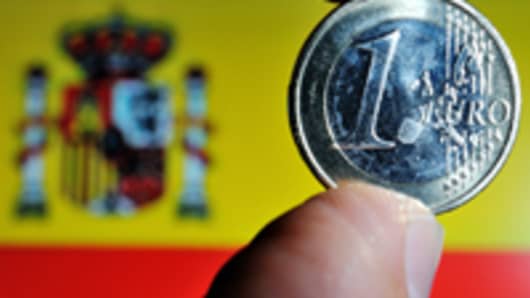The euro gained for a fourth straight session against the dollar on Monday to hit a six-week high as news from Spain and Greece eased concerns about the debt-burdened countries while data out of China allayed worries about global economic growth.
The single currency shared by 17 countries gained against the greenback on signs Germany may be open to a Greek debt write-down, but it hit a new high after Spain formally asked for European funds to recapitalize its banking sector.
Demand for euros was also buoyed by business surveys showing the euro zone's manufacturing sector shrank a little less rapidly in November and data showing Chinese manufacturing output grew last month for the first time in more than a year.
The expansion in Chinese factory activity should provide a boost for world growth, particularly since recovery in the debt-strapped euro zone still appears a long way off.
The array of positive news far outweighed a report showing a surprise contraction in U.S. factory activity.
"There was much more positive news today than negative and that is why the euro has strengthened," said Charles St-Arnaud, foreign exchange strategist at Nomura Securities in New York.
The euro was helped by Spanish and Italian bond yields falling as investors became more confident about buying euro zone debt, and Greek bonds rallied after the announcement of details of a debt buy-back.
"The spreads on Spain's debt versus Germany's have compressed substantially, which has also helped the euro, but it also takes pressure off of Spain to ask for a full government bailout," he said.
If Spain requests a government bailout, the euro should rally even further as it sets the stage for the European Central Bank to buys its bonds.
German Chancellor Angela Merkel said on Sunday Greece's creditors may look at writing down more of its debt, a move that would make the country's debt burden more easily sustainable.
Greece said it would spend 10 billion euros ($13 billion) to buy back bonds at a price range that topped market expectations, boosting hopes it can cut its ballooning debt and unlock long-delayed aid.
A successful buy-back is central to the efforts of Greece's foreign lenders to put the near-bankrupt country's debt back on a sustainable footing and would clear the way for the funding Athens needs to avoid running out of cash.
"The successful completion of the repurchase will unlock bailout cash from the IMF and help secure the flow of rescue funds from the so-called 'troika' in 2013," said Ilya Spivak, currency strategist at DailyFX in New York.
Greece's "troika" of lenders includes the International Monetary Fund, European Union and the European Central Bank.
"Confidence may be threatened as the closely watched U.S. ISM print comes across the wires," Spivak said.
The euro climbed to $1.3076, its highest since Oct. 22, before paring gains to last trade up 0.6 percent on the day at $1.3064.
Traders said stop-loss orders were triggered on the break of $1.3030, and market players who had previously bet against the euro were squaring their short positions as it moved higher.
There was talk of an options barrier at $1.3050, with some traders expecting sellers around that level.
'Fiscal Cliff' Fears
Despite the euro recovering from falls after ratings agency Moody's downgraded the euro zone rescue funds late Friday, the single currency looked vulnerable to continuing concerns about how the euro zone will deal with its debt crisis and worries about the U.S. "fiscal cliff."
If Congress and Washington cannot reach a deficit reduction deal by the end of the year, massive U.S. government spending cuts and tax rises will be unleashed in early 2013. Many economists believe this "fiscal cliff" has the potential to tip the U.S. economy back into a recession.
Signs policymakers are struggling to reach an agreement to avert that scenario could boost demand for the highly liquid dollar, which is considered a safe-haven currency.
"Resolution of the U.S. fiscal cliff still seems some way off, and it is increasingly likely that a comprehensive agreement will be delayed into the new year, meaning the economy may go over the cliff in January only to be hauled back up again soon after," said Simon Hayes, analyst at Barclays Capital.
The yen has been under pressure on expectations that a likely change in Japan's government later this month will lead to aggressive monetary easing.
The dollar last traded down 0.3 percent against the yen at 82.25.


